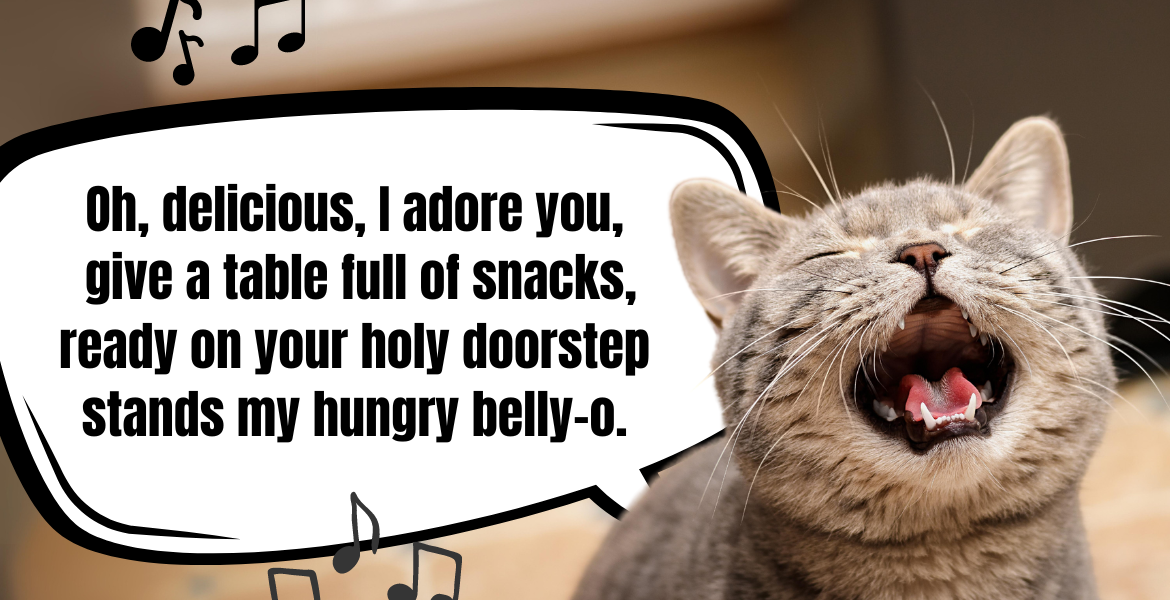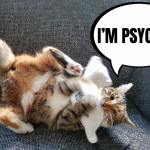Meowing is one of the most important ways a cat communicates with their human Guardian. Unless you have a quiet feline, fabCat (lucky you!), you will surely hear your kitty wail that their bowl is empty, the litter box is full, the balcony is closed, or there’s a fly sitting too high on the wall and it’s impossible to catch. Cats are the kings (and queens) of drama! But why do they love to perform their concerts precisely when their beloved Guardian is turning over in bed, trying to get some sleep before the alarm? Let’s find out together, fabCat!
Why Do Cats Meow?
Among cats, meowing is primarily a communication tool reserved for kittens under the care of their mother. This is how they signal their needs, and the mother cat tends to them accordingly. As cats grow older, they lose the need to meow at each other. But with humans, it’s a whole different story. Even with all the advancing feline knowledge and education, we humans still don’t fully understand cat body language. We generally know what a wagging tail, flattened ears, or bristling back means, but when it comes to more subtle signals, we often miss them. And when a cat wants attention, they’ll do everything to make sure they get it. This is how the script for the nightly cat concerts begins.
Your cat might meow when:
- They want to say hello,
- They need food,
- They need water,
- The litter box is full,
- They want to tell you they missed you,
- They want to ask for peace,
- They’re scared,
- They want to go out on the balcony…
…and that’s just the beginning of the list. In reality, every message a cat wants to convey can be expressed through a meow. Of course, it’s hard for us to understand many of these – cats haven’t yet come up with the idea of publishing a dictionary of meows and purrs. However, there are a few pretty obvious situations and messages worth knowing and analyzing when your cat is persistently trying to communicate with you, day or night.
Why Does My Cat Meow at Night?
In reality, nothing might be wrong – a cat’s meow doesn’t always indicate pain, suffering, or stress. Remember, cats are crepuscular creatures, most active at dusk and dawn. What feels like a midnight wake-up call to us is a natural time for cats to wake up and “hunt” — which, in a home setting, often translates to playtime and a full bowl. Not every kitty behaves this way – many quickly adapt to their Guardian’s schedule and sleep through the night without any issues. If your cat doesn’t belong to this elite group, start by observing their habits and see if adding an extra meal and some playtime before bed helps regulate their biological clock. If the problem persists, automatic food dispensers and interactive toys can be good solutions for nighttime distractions. A cleverly hidden Kung-Fu cat toy for your cat to “hunt” at night is also a great plan.
Another reason for nighttime meowing and antics could be the litter box. Cats typically fall into two categories: those who don’t mind a few surprises in the litter box and those who need a cleaning crew (aka humans) on standby. The latter often includes cats who go bonkers after depositing their “number two” in the litter box. This habit is tough to break. What can you do? First, check with your vet to ensure that the meowing and litter box escapes aren’t signs of health issues. If all is well, your next step is to provide your cat with an extra, clean litter box and clean out all the boxes before bed. Chances are, with enough alternative options, your cat will give up on having you clean the box during the night shift.
Lastly, your cat might be putting on nighttime operas out of sheer loneliness. Perhaps they don’t have access to your bedroom or are simply bored? Make sure you’re meeting your cat’s needs for affection, activity, and exercise both before bed and in the morning. If you give in during the night and your fabCat realizes that you’ll get up to pet them on demand, they’ll only meow louder and more persistently to get your attention.
Can Nighttime Meowing Indicate Health Problems?
Absolutely. You’ll especially notice this if your cat typically doesn’t meow much, doesn’t do so at night, and suddenly starts putting on nightly performances. This is a strong signal that something isn’t right, and you, as their fabCat Guardian, should investigate further. What could be the issue?
- Looking for a mate. Unspayed/unneutered cats meow at night when they hear other cats calling, fighting, and mating outside your windows. While this can be dangerous for them, they can’t resist their instincts. In non-breeding cats, neutering/spaying can have positive effects not only on behavior but also on health. If your cat hasn’t undergone this procedure yet, consider it, fabCat.
- Injury or accident. Unexpected nighttime meowing could mean something has happened. Sometimes it’s a claw stuck on the couch that the cat can’t free, other times it’s vomiting, or a sprained paw after a leap off the cat tree or another mechanical injury. While it’s not worth jumping out of bed for every meow, if you hear a loud cry from a usually quiet cat, it’s definitely worth checking out what’s going on.
- Chronic health conditions. Health problems like hyperthyroidism, digestive issues, hypertension, or kidney problems can lead to changes in your cat’s behavior, including increased vocalization. If you can’t identify a clear reason for your cat’s sudden nighttime meowing, a vet visit should be at the top of your priority list.
What to Do When Your Cat Meows at Night?
It all depends on the cause: is it behavioral or health-related? If you wake up and check that nothing urgent has happened, and the meowing continues night after night, your first stop should be the vet clinic. Explain the changes you’ve observed. It could just be the nighttime meowing, but often other “fun” behaviors accompany it: litter box issues, loss of appetite, lack of energy to play, or apathy. Your vet will run the appropriate tests, rule out health problems, and recommend treatment if necessary.
Once health problems are ruled out, it’s time to look into your cat’s behavior. You can start by observing when and why your cat meows. What happens if you get up? Does your cat have enough play, food, observation spots, and scratching posts in its environment? With these observations, you have a foundation for discussing the issue with a cat behaviorist: they can advise you on what to do next, how to respond to your cat’s attempts to get your attention, and how to, most importantly, redirect your cat’s focus so you, fabCat, can get a good night’s sleep.
When a cat meows at night, they never do it out of spite. It’s their way of saying: “Human, I have a need. Pay attention to me.” Remember, a feline opera doesn’t have to be the reason you’re not sleeping at night. But to prevent it, you need to understand your cat’s needs and take proper care of them. Do your furry friends sing at night, fabCats? Share your experiences in the comments – all tips are always welcome!




